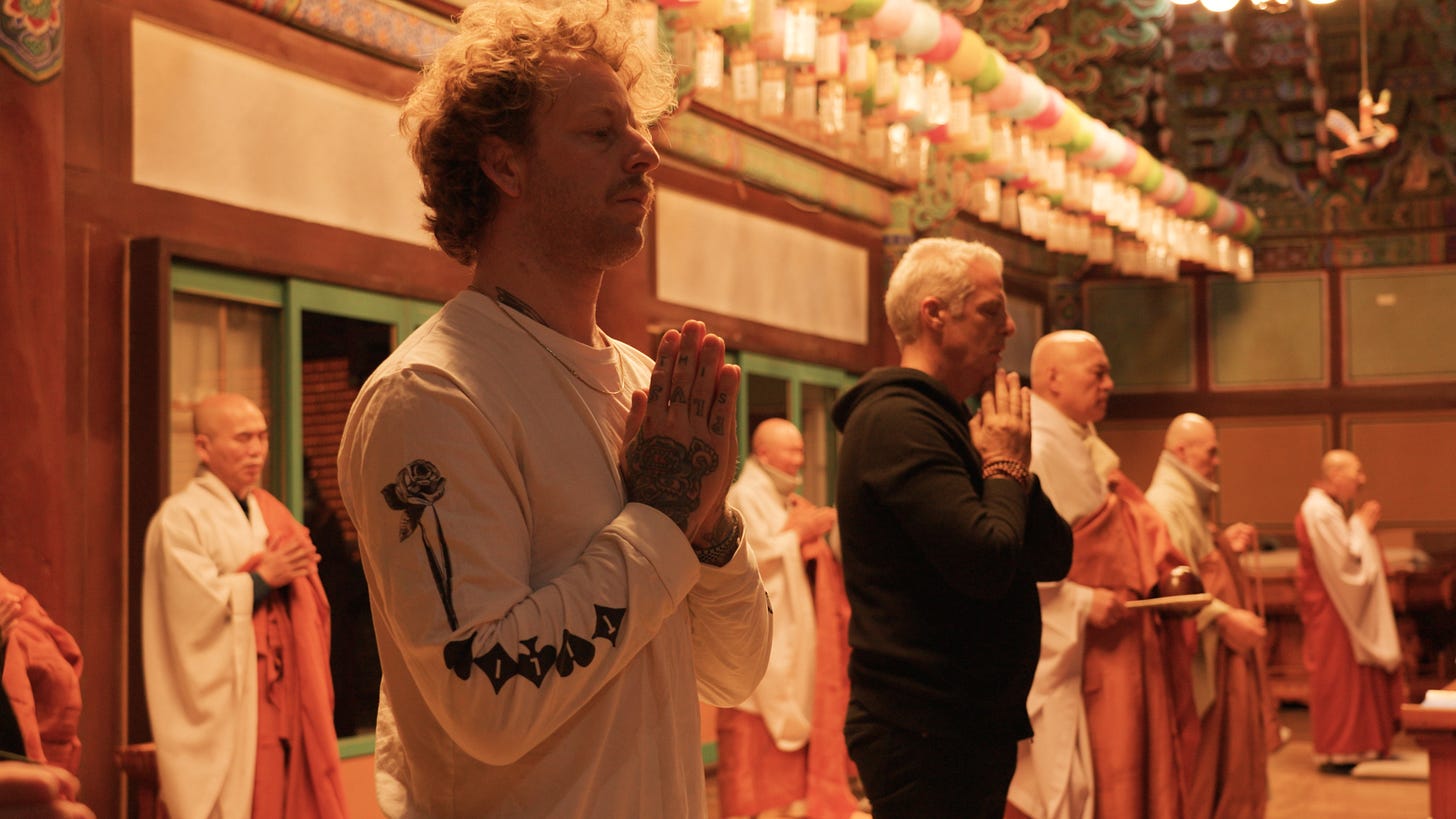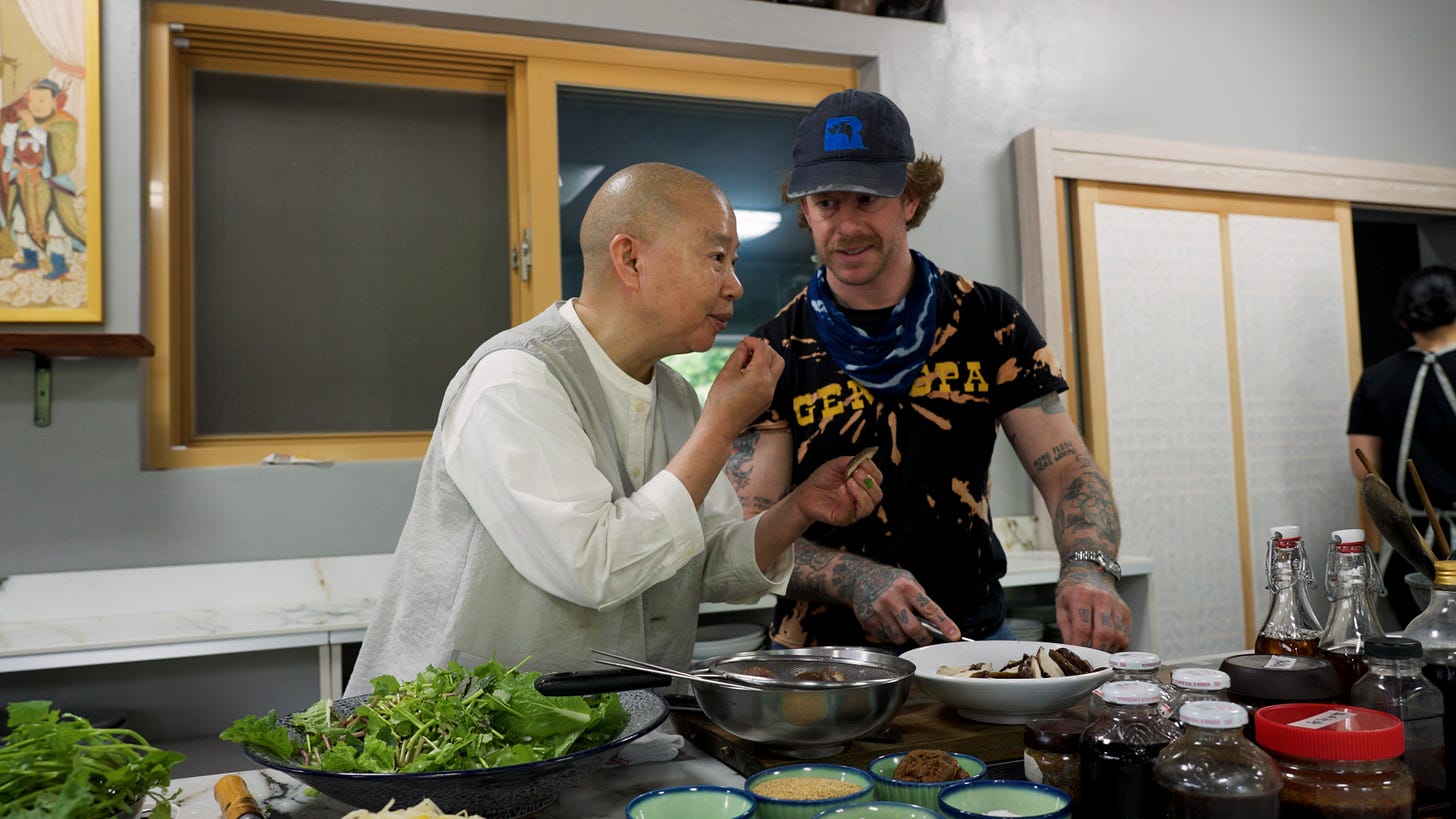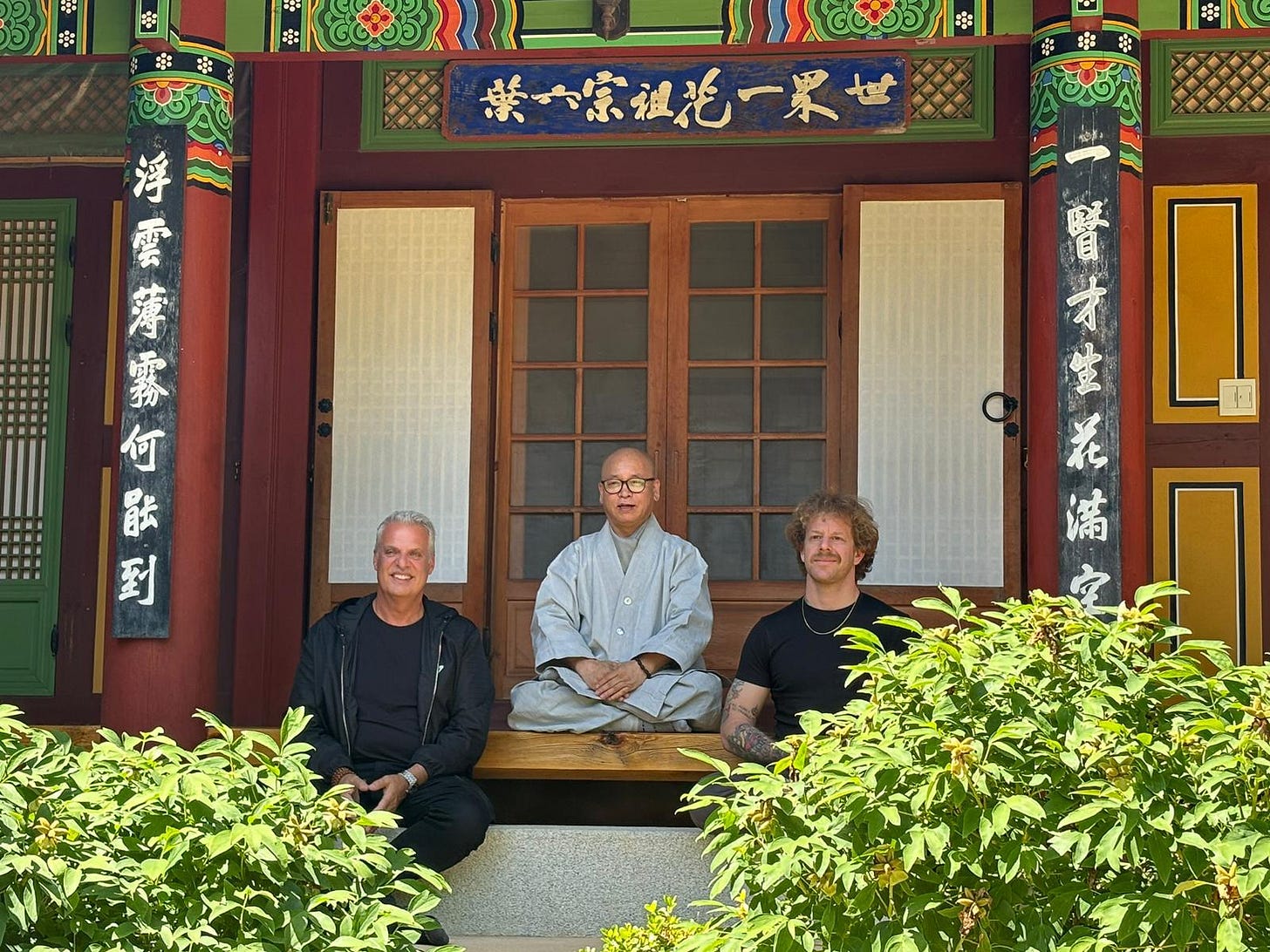It's a Crying Shame But Maybe Not A Bad One
Lessons form travelling halfway across the world with Eric Ripert to a Korean monastery
Wrinkleless robes perfectly draped, Mu Kong (무공 ), the abbot of the 1,400 year old Baekyangsa temple in Jangseong, Korea sat on a cushion in his office at the monastery making tea. Behind him, framed through an open door, the jagged peak of Mount Naejang-san jagged across the sky. On the other side of the low wooden table, I sat next to Eric Ripert, and Wookee Jhin, our translator. Eric and I were in Korea to visit the monastery’s most famous resident, the nun Jeong Kwan seunim.1 To anyone who has seen Chef’s Table, which made her famous, Jeong Kwan cuts an indelible figure. A small woman with a shaved head, wearing a nun’s gray robes, Jeong Kwan is the preeminent practioner of eumsik (음식), or temple cuisine. She’s also funny and fierce, demanding and kind, spiritual, sure, but also a lot of fun to be around.
Eric was there because he’s a Buddhist and a long-time supporter of Jeong Kwan. She appeared on his show Avec Eric well before her appearance on Chef’s Table. (Jeff Gordinier captured some their magic in a New York Times piece. I was there for a few reasons. The trip was organized by Nadia Cho, with whom I had co-written one of my latest books Jang: The Soul of Korean Cooking. Separately, infusing cooking (and eating) with spirituality has long interested me. I spend so much of my time either cooking or eating that to unlock their spiritual potentials seems a deeply important project.2 It’s like renewable spiritual energy. Thirdly, I too am a Buddhist thanks largely to Eric Ripert. Fourteen years ago, when I was an angry young man, interviewed Eric for Eater. (The series of interviews, called Eaterrogations, is still one of the favorite things I’ve ever done.) Discussing a ridiculous New York Times post in which a writer was kicked out of Marc Forgione’s namesake restaurant for venturing into the kitchen to tell the chef to stop yelling at a cook, Eric said, “No one is happy to be angry.” As I wrote in that piece:
[Later that night at dinner, my wife hurt my feelings inadvertently. During the Top Chef follow-up, I asked Chef Ripert how being hurt factors into the happiness/anger dichotomy.]
Obviously you get hurt at times or you can feel angry, but what you have to learn is how to let it go without hurting other people. If you are, for instance, someone very sensitive and get hurt very easily, you can through meditation become strong and have a better understanding of what is hurting. As a Buddhist I think it comes from karma and since Buddhists believe in incarnations can come from this life or another life. It took me 20 years to understand when and why I feel hurt.
Basically, nothing has a true reality in itself. Look up the Buddhist Theory of Emptiness. The concept that all beings and events are interconnected and so there is no concrete reality. All is emptiness.
In 2016, I converted to Buddhism. In 2019, I got divorced. (In retrospect, I’m not sure my then-wife did hurt my feelings so inadvertently.) Regardless, to be back in Korea, with Eric, at a monastery, not so much as a chef and a writer but more as dharma brothers was a full circle moment. And you don’t get too many of those.
Mu Kong, Mu Kong explains, means Big Nothing. Mu also has a special significance. In the Gateless Gate, a collection of Zen riddles called koans by the 8th century Zen master Zhaozhou, one of the koans is as follows:
A monk asked: “Does a dog have Buddha-nature or not?”
The master said, “Mu!” [No]
No, here, isn’t really a negation as much as it is a negation of discursive thought, a negation of the duality between self and other and even within oneself.3 All Zen is some iteration of mu. I’ve always thought of it as the Zen version of the Yiddish exclamation nu, an untranslatable expression meaning something like “so what?” or “come on.”
Any way, as the abbot discussed the tenets of temple cuisine, I was both present and not present. My body was in Baekyangsa but my mind was in the blue basement.
The night before I left New York for Seoul, I had gone to jiu-jitsu at Renzo Gracie Academy in the city. There’s a teacher there, a tall handsome Korean guy, who teaches the no-gi class after the gi class I took. We had had a couple interactions in the past. He was a fan of the Seoul National University varsity jacket I had bought the last time I was in Korea. He was not a fan of my experiment in wearing short shorts and a tank top to class. His disdain for me was palpable, something I knew and felt a way about. That night, before I left, I wanted to ask him where he trains in Seoul. So, I stood by the side of the mat, waiting for hima break in the instruction. When there was one, I asked from the side “Can I ask you a question?”. He gave me a whithering look and said, “No dude. Im’ in the middle of teaching.” He was right. I shouldn’t have asked him and it was a breech in mat etiquette. “OK,” I said, “Sorry” and slinked up the stairs out of the gym. On the 15 hour flight to Seoul, that’s all I could think of. Every time I thought of it, shame would wash over me, a disgusted shiver of regret and repulsion. It was intense and that intensity was compounded with the slightly panicked realization that my reaction was completely disproportionate. The guy had probably long dismissed my intrusion as just another example of my general buffoonery.
We had a few more minutes in our audience with the abbot. Silence had fallen, except for the songs of the warblers and wagtails outside. “Are there any other questions?” asked Jhin, the translator. About temple cuisine? No. I was just learning enough to even know what questions to ask. But what if, instead of asking as a writer, I asked the monk a question as a struggling human. “Yes,” I said, “It’s a little off-topic but what about shame?”
As Jhin translated, Kong smiled slightly. He poured another cup of tea from the electric kettle then began to speak. “For a way-seeking mind, shame,” he said, “is a good thing.” A good thing? I thought. Perhaps that hadn’t been correctly translated. But he continued, “Shame is feedback that you have done something wrong. It is useful so you can do better in the future. Shame can teach you.”
As we headed to Jeong Kwan’s hermitage, just up the mountain from the monastery, I contemplated what Abbot Kong meant. For me shame has always been irredeemably shameful. A crushing weight, a rib-cage contracting shoulder tensing ew of self. So much of the work I had done around shame had been about getting rid of it. But perhaps, and this is what Kong meant, I simply wasn’t listening to the lesson latent in the feeling. There was something there but what was it?
Over the next few days, I had plenty of time to contemplate. Eric and I were staying in austere rooms at Baekyangsa’s TempleStay program. Every morning we awoke at 4 a.m., walking through the darkness to the main temple hall with its trio of giant golden Buddhas. We meditated with the monks; listened to their chants; each of us following our own rituals. (Eric is a Tibetan Buddhist; I am part of a Zen community.) I used Kong’s question as the object of meditation.
Look, I’m not everyone’s cup of tea. I can be abrasive, outrageous and provocative. As I’ve gotten older, I’ve grown slightly less outré but only slightly. (Shame in the outrageousness of my youth, when I was known as Josh Stein, is one reason I changed to Joshua David Stein. SEO primacy of Stanford gymnast Josh Stein was the other.) Some people don’t like me for what I’ve done, which is fine. I’ve done a lot of unlikable things. Some people don’t like me for who I am, they are repulsed on an almost philosophical level. I’m just not their type of person. Unfortunately for me, these type of people — stoic, well-reasoned, competent — are exactly the type of person I admire. So frustratingly, for me and probably annoyingly for them, I have a tendency, an addiction almost, to try to win folks like this over. In 42 years, it has never worked. The more I engage, the more their vision of me as abrasive, try hardy and uncool is reinforced. How could it not be? And every time my overtures are met with retreat, every time I dig my hole deeper — “Can I ask you a question?” he asks questioningly — cataracts of shame wash over me. But what if this shame isn’t saying, “You are unlikable. How pathetic it is that you try?” What if it is trying simply to teach me that not every one is going to like you. And that’s okay. You don’t need to try to change that.
To travel halfway across the world to a mountain in South Korea in order to have a realization as basic and obvious as not everyone is going to like you seems like a vast and useless addition to the carbon footprint. Where and when the truth hits you is unpredictable though softening the mind to receive it is, to some degree, under your control. The quietude of Baekyangsa, the unexpected audience with Mu Kong, the general softening of self that accompanies travel, all which turned my mind to the dharma, somehow allowed the realization to get through my standard ramparts.
Back from Korea and finally with some space in my schedule, I’ve been making up for lost time at jiu-jitsu which means, of course, I’ve seen that guy a few times since I got back. Thus far, I’ve resisted the urge to greet him, or to apologize for my faux pas (though I’m sure it has long been forgotten), or to try to engage him in friendly conversation or to relate my deep realization that I don’t need to seek his approval (which would not go over well.) Instead, I just am and he just is and perhaps there is no he and me and between us there is, well…mu.
Seunim, an honorific, roughly means reverend.
Among my favorite texts are the 13th century Zen master Dogen’s seminal essay Tenzo Kyokan; Bernie Glassman’s modern interpretation Instructions to the Cook: A Zen Master’s Lessons to Living a Life That Matters and Edward Espe Brown’s No Recipe: Cooking as Spiritual Practicce.
More has been written on this syllable than perhaps any other in Zen thought. A good place to start is the Book of Mu, a collection of Zen stories and koans.




I love this!